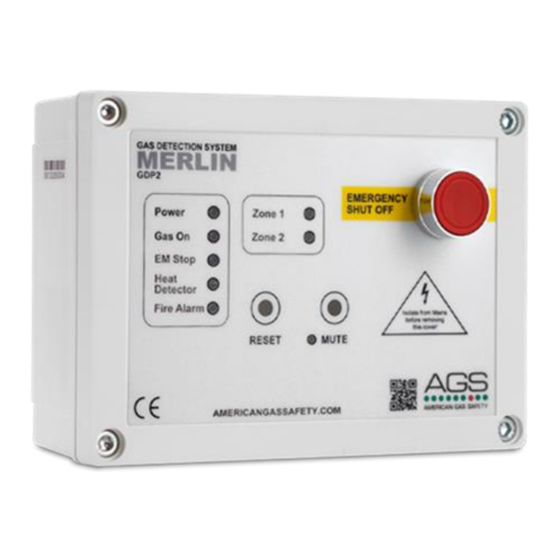AGS Merlin GDP2 Installazione Funzionamento e manutenzione - Pagina 9
Sfoglia online o scarica il pdf Installazione Funzionamento e manutenzione per Controllore AGS Merlin GDP2. AGS Merlin GDP2 12. Safe area gas detector controller
Anche per AGS Merlin GDP2: Manuale d'uso e installazione (7 pagine), Manuale d'uso (12 pagine)

Installation & Operation Manual
How often?
Regular bump tests are important to make sure the detector is able to detect a release of gas as early as possible
and usually takes seconds (gas type dependant i.e. CO sensors will take over a minute) and is often completed
alongside a scheduled fire alarm test, however the frequency should be determined following an appropriate risk
assessment by the end user. Remember, bump testing does not remove the need to have gas detectors inspected,
calibrated and serviced periodically by a competent person.
What do I need?
Contact your AGS representative for details of suitable bump testing kits and gases. Kits usually consist of a certified
gas cylinder; flow control regulator, tube pipe and applicator cone. We recommend only using AGS calibration gas
kits to ensure correct flow rates meet AGS technical requirements. A bump testing gas is usually a concentration
mix that exceeds the highest alarm set point.
See below for recommended gas concentrations for bump testing your detector.
Detector Type
CO - Carbon Monoxide
NG - Methane
LPG - Liquid Petroleum Gas
H - Hydrogen
O
- Oxygen
2
All certified test gases supplied by AGS are classified as non-flammable and non-toxic; however, they do contain gas
under pressure and may explode if heated to extreme temperatures and cause asphyxiation in high concentrations.
How to perform a Bump Test?
1. Ensure you have the correct gas for the device type prior to application.
2. Screw and seal the regulator/valve into the gas cylinder outlet.
3. Once sealed, the regulator pressure gauge will indicate cylinder pressure.
4. Offer up the applicator hose/cone to the lower vents.
5. Open the valve/regulator to allow the gas to be delivered at a pre-set flow rate.
7. Wait for the device to enter alarm status and energise configured outputs/relays.
At this point...
9. Remove applicator hose/ cone and turn the gas cylinder regulator/valve off.
10. Wait for the device to return to normal.
11. Reset the system if required. Record your test details.
Notes:
To increase reaction time, cover the escape vents at the top of the device.
Alternatively, enclose the device and apply gas i.e. in an airtight bag or container.
For more help and advice on bump testing – contact us.
Always remove the regulator/valve from cylinder after use!
Always check cylinder pressure upon sealing valve – there may not be a sufficient amount of gas!
All AGS cylinders will re-seal upon removal of the regulator/valve!
Always give at least five (5) minutes between testing the same unit or until gas has fully dispersed!
Always consider safety and use equipment in accordance with Safety Data Sheets!
Rev: 8 03-21
Bump Test Gas
400 - 500ppm (balance in air).
0.6 - 0.8% BV (balance in air)
0.3 – 0.4% BV (balance in air)
5000 - 6000ppm (balance in air)
15% (balance in Nitrogen).
Merlin GDP2
Response Time
<120s
<30s
<30s
<30s
<60s
9
